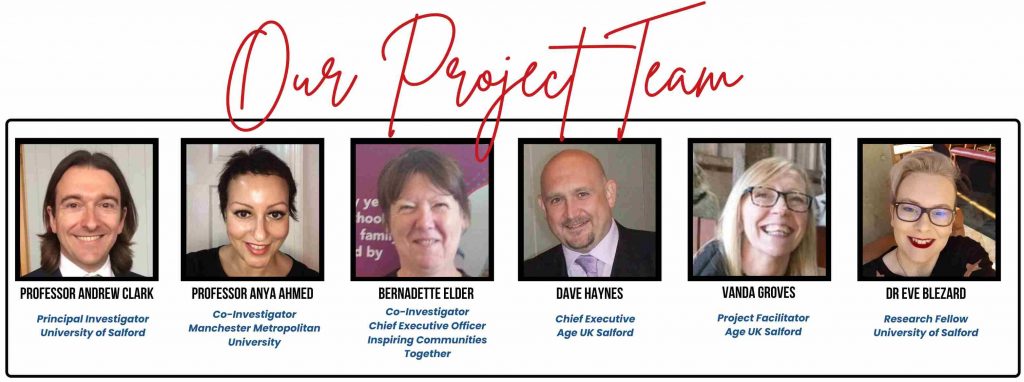Developing Age-Friendly Communities in an emergent Post Pandemic World

Welcome to our project
This work is funded by the Dunhill Medical Trust as part of its Building and Developing Suitable and Sustainable Living Environments and Communities for an Ageing Population.
The work will provide new insight to the impact of the Covid-19 pandemic on older people’s social connections and develop evidence-based recommendations on how places can continue to support older people.
Across the UK, older people are reported to have been disproportionately negatively affected by the disease and restrictions imposed to limit its risks. This includes reduced physical activity and, potentially, heightened isolation.
However, we do not yet know the full impact of the pandemic on how older people can remain socially connected in the places where they live, nor do we understand how age-friendly initiatives can encourage and support older people’s social (re)connections over coming years.
The project will address three questions:
• How have older people made connections within and around their environments during the pandemic and what can we learn from this as we move out of it?
• What has the impact of Covid-19 been on older people and their living environments; and how can the development and adaption of new and existing support activities help age-friendly places to succeed?
• How have activities for older people changed and might these continue to adapt post Covid-19?
We will work with Age-Friendly Salford to test out how places can continue to be made age-friendly as the UK moves to the next phase of Covid-19. We will do this by collecting and analysing new data gathered using a range of techniques in five phases:
• Phase 1: Focus groups with individuals from organisations that support older people or develop policies to support them.
• Phase 2: Interviews with older people to gather new insight to experiences of accessing and engaging with remote support and engagement activities.
• Phase 3: Completing an audit of age-friendly locations, services and businesses
• Phase 4: Engaging in a series of ‘Conversations about Ageing’, led by older people, based on the findings from Phases 1, 2 and 3
• Phase 5: Developing recommendations and informing others of findings
Older people will be involved in all stages of the project, from contributing ideas and sharing their experiences to working as co-researchers on the team. They will be supported to undertake an assessment of how age-friendly activities adapt in an emerging post-pandemic UK using an age-friendly standards toolkit. The group will also work with the project team to host a series of Conversations with service providers, policy makers and other older people.
Who is Involved?
We are a dynamic team of academic researchers, experts in community development, and older people. We work at the University of Salford, Manchester Metropolitan University, Inspiring Communities Together, and AgeUK Salford
Our Project Team:
Principle Investigator: Professor Andrew Clark, University of Salford
Co-Investigator: Professor Anya Ahmed, The Manchester Metropolitan University
Research Fellow: Dr Eve Blezard, University of Salford
Co-Investigator: Bernadette Elder, Chief Executive Officer of Inspiring Communities Together
Project Facilitator: Vanda Groves, Age UK Salford
Project Facilitator: Dave Haynes Age UK Salford

What have we been doing?
Please stay updated with our Project Updates page and find out about our engagement and events through our events page.
Want to get involved or know more?
Developing Age-Friendly Communities Salford (@SalfordAgeing
Dr Eve Blezard
University of Salford
School of Health and Society
Salford
Email: e.blezard3@salford.ac.uk
Telephone: 07890439502
Prof Andrew Clark
School of Health and Society
University of Salford
Salford
Email: a.clark@Salford.ac.uk